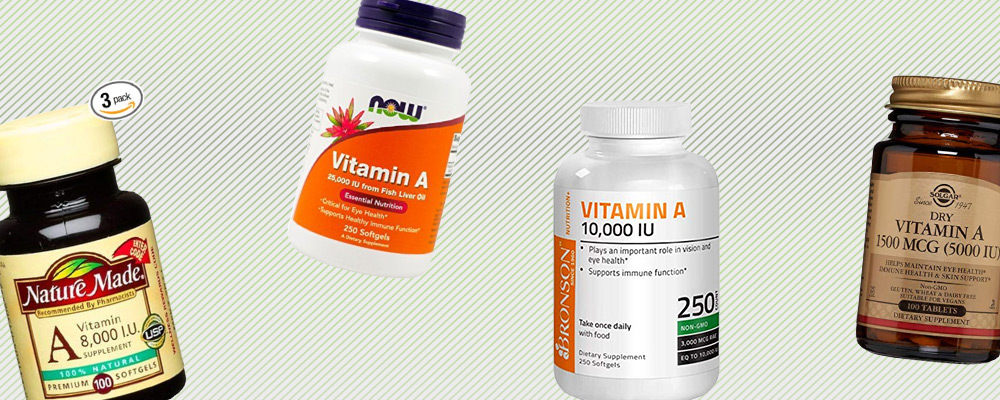Vitamin A is a catch-all term for a variety of fat-soluble compounds that are important to human health. Also known as retinol, some research suggests a lack of Vitamin A can negatively impact vision, and other research shows that maintaining adequate Vitamin A levels may help prevent age-related macular degeneration (1) (2). There’s also a bit of research that shows Vitamin A may be beneficial to the immune system (3) (4). Though many folks use Vitamin A supplements to treat acne, the American Academy of Dermatology actually recommends using topical retinol in treating your skin (5).
Found in a variety of foods, most folks following a well-balanced diet will ingest enough Vitamin A to meet the Recommended Dietary Allowance; Vitamin A deficiency is quite rare outside of developing countries (6). In supplement form, it’s most commonly found in capsules or tablets of varying strengths, either as beta-carotene or, more commonly, retinol. It’s worth noting that excessive Vitamin A in the form of retinol can be toxic with potential side effects, and the Food and Nutrition Board has established a daily Upper Limit of 10,000 IU (International Units) (7). Before introducing Vitamin A supplements to your diet, it’s important to consult with a medical professional. There are a lot of Vitamin A options on the market – it’s important to understand some key differences between them.
Editors’ Choice

Bronson Vitamin A
Pros:
- Bronson’s Vitamin A softgels include 10,000 IU per serving
- At less than a nickel per softgel, these are a very competitively priced item.
- Bronson includes a 1 year money back guarantee with their Vitamin A pills.
- Their softgel caps are touted as being rapid release.
Cons:
- Because they utilize gelatin in these softgels, these are not vegan-friendly.

These consumer-friendly priced Vitamin A supplements are produced in a Good Manufacturing Practices facility and contain synthetic retinyl palmitate, a lab-made source of Vitamin A. With 10,000 IU per softgel, these are a generous dose of Vitamin A.
High Potency Option

NOW Foods Vitamin A
Pros:
- On a per capsule basis, this is one of the most competitively priced Vitamin A supplements on the market.
- NOW Foods Vitamin A capsules include 25,000 IU per capsule, making up 500% of the Recommended Dietary Allowance as prescribed by the National Institute of Science.
- The Vitamin A in these capsules is derived from fish liver oil, including cod, saithe, haddock and pollock
- Manufactured in a softgel capsule.
Cons:
- A few reviewers mentioned that these capsules did lead to some rather unpleasant “fishy burps.”
- These Vitamin A supplements are not vegan-friendly.
- With 25,000 IU per capsule, this supplement is well above the Upper Limit of the daily recommended amount. Consult a medical professional.
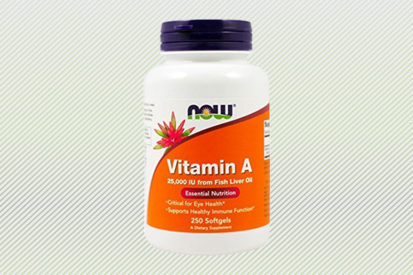
NOW Foods offers a Vitamin A supplement derived from fish liver oil at a very competitive price. This non-GMO supplement packs a whopping 25,000 IU per capsule, making it the highest of the products we looked at. This is actually above the daily Upper Limit of 10,000 IU as recommended by the NIH, and so you may want to consult with a medical professional before adding this to your diet.
Best Vegan Tablets
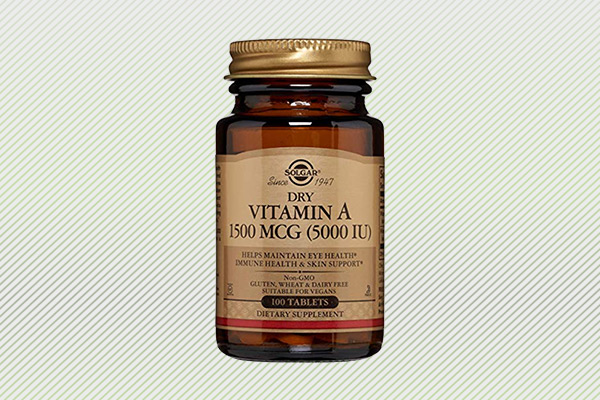
Solgar Dry Vitamin A
Pros:
- As these tablets are not made with any animal products, they are vegan friendly.
- Solgar produces their Vitamin A tablets with no gluten, dairy, preservatives or artificial flavor.
- These tablets include 10mg of Vitamin C, or ascorbic acid, giving you a little extra vitamin boost.
Cons:
- At 5,000 IU per capsule, this is among the least potent of all the Vitamin A nutrients we looked at.
- Though the dry tablets are designed to be smaller and easier to swallow than some larger capsules, some folks complained they are actually harder to swallow.
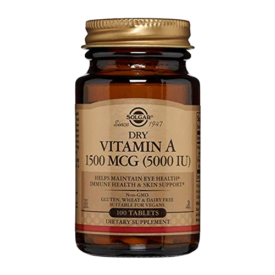
Solgar offers a Vitamin A dry tablet that is gluten free, dairy free and vegan friendly. With 5,000 IU per serving and even a bit of Vitamin C in the mix, these are a nutrient rich source of retinyl palmitate.
Medium Strength Capsule
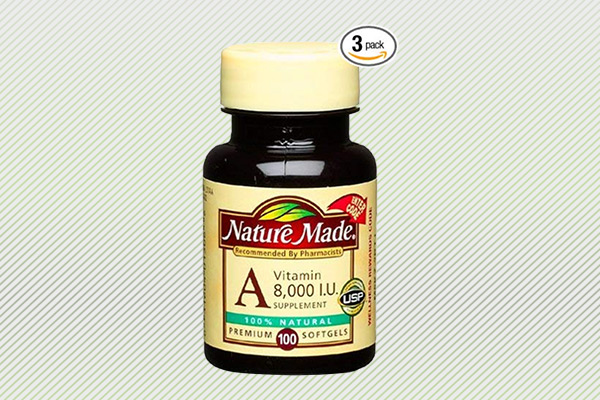
Nature Made Vitamin A
Pros:
- These softgels are made without any preservatives, yeast, starch, or gluten.
- The Vitamin A in Nature Made’s Vitamin A supplement comes from fish oil.
- Each softgel contains 8,000 IU of Vitamin A.
Cons:
- Since these softgels are made from fish oil, they’re not considered vegan.
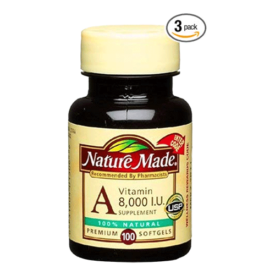
Priced very competitively at around a nickel per pill, Nature Made offers a very straightforward Vitamin A supplement. At 8,000 IU per serving, these are in the middle range in terms of concentration compared to some of the other Vitamin A supplements on the market.
Methodology
Vitamin A is a popular supplement, often used maintain vision health and a healthy immune system. Before adding it to your daily regimen, you should consult with a medical professional to insure that Vitamin A is right for you. When looking at the various types of Vitamin A supplements on the market, it’s important to consider a few distinguishing features.
Potency
Depending on your needs, Vitamin A may not justify a more is more mindset. Take a look at the IU, which stands for International Units. For a frame of reference, the daily Recommended Dietary Allowance as established by the National Institute is 3,000 IU for men and 2,333 IU for women (6). It’s important to note, also, that the Upper Limit for daily Vitamin A intake is 10,000 IU. Since Vitamin A is fat soluble, excessive amounts of it can be stored in the body’s liver, and can have potentially toxic results.
Type of Vitamin A
Put simply, there are two basic types of Vitamin A: beta-carotene and retinol, also known as preformed vitamin A. Beta-carotene is largely found in leafy greens, vegetables, and fruits, while retinol is most often found in meat products and dairy. While some Vitamin A supplements are comprised of a mixture of beta-carotene and retinol, many will include just retinol.
Among retinol supplements, some will be sourced from fish oils, while others are chemically produced retinyl palmitate. Check the label to see what you’re getting, and as always, consult a medical professional before adding this to your diet.
Type of Pill
Depending on your personal preference, take a look at the type of pill each brand makes. Some will offer larger capsules, while some utilize small, dry tablets.
Dietary Considerations
Not all Vitamin A supplements are vegan-friendly. If you follow a vegan diet, you’ll want to make sure you’re getting a supplement made from retinyl palmitate as opposed to fish oil.
Cost
Divide the total cost by the amount of pills or capsules in each container to figure out the price per serving of each offering.
BarBend Tips
- Consult with a medical professional before adding Vitamin A to your diet.
- Check the label to make sure you know what’s in the capsule. You may want to avoid unnecessary additives or flavorings.
- The Food and Nutrition Board has established a daily Upper Limit of 10,000 IU for Vitamin A. You should talk to a medical professional before taking any Vitamin A supplement, but especially one that goes over this limit, as excessive Vitamin A intake can be toxic.
Vitamin A may be an effective supplement for some folks try to maintain or improve vision health and their immune system. Though most folks who follow a well-balanced diet will get an adequate amount of this fat soluble vitamin, some may turn to a supplement to boost these levels. However, before introducing additional Vitamin A to your system, you should consult a medical professional.
References
- Wiseman EM, Bar-El Dadon S, Reifen R. The vicious cycle of vitamin a deficiency: A review. Critical reviews in food science and nutrition. 2017;57(17):3703-3714.
- Wu J, Cho E, Willett WC, Sastry SM, Schaumberg DA. Intakes of Lutein, Zeaxanthin, and Other Carotenoids and Age-Related Macular Degeneration During 2 Decades of Prospective Follow-up. JAMA ophthalmology. 2015;133(12):1415-1424.
- Sommer A, Katz J, Tarwotjo I. Increased risk of respiratory disease and diarrhea in children with preexisting mild vitamin A deficiency. The American journal of clinical nutrition. 1984;40(5):1090-1095.
-
Stephensen CB. Vitamin A, infection, and immune function. Annual review of nutrition. 2001;21:167-192.
-
Topical therapies: Recommendations | American Academy of Dermatology. Aad.org. https://www.aad.org/practicecenter/quality/clinical-guidelines/acne/topical-therapies. Published 2014.
-
Office of Dietary Supplements – Vitamin A. Nih.gov. https://ods.od.nih.gov/factsheets/VitaminA-HealthProfessional/. Published 2017.
-
Office of Dietary Supplements – Vitamin A. Nih.gov. https://ods.od.nih.gov/factsheets/VitaminA-HealthProfessional/#h8. Published 2017.
